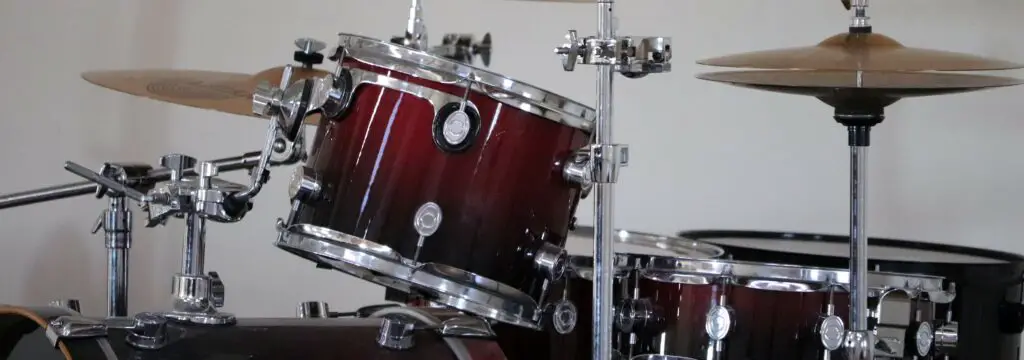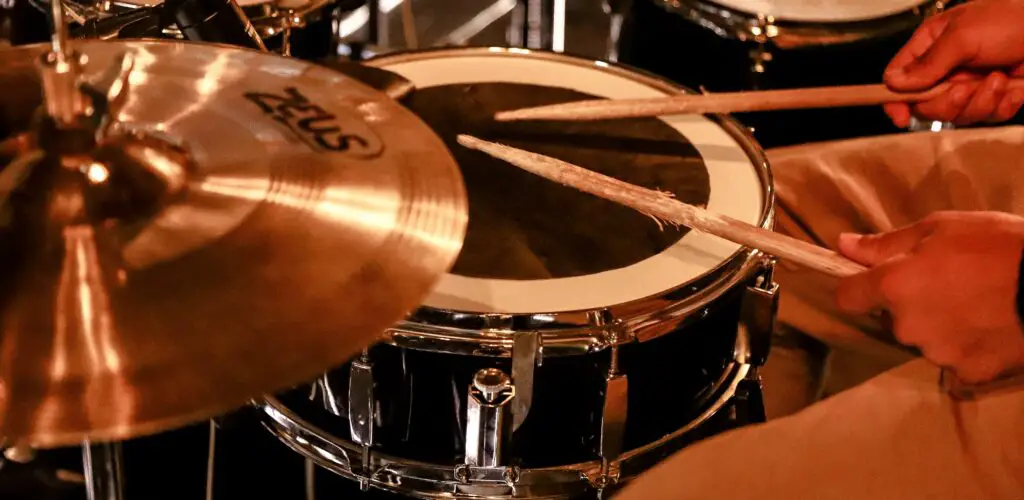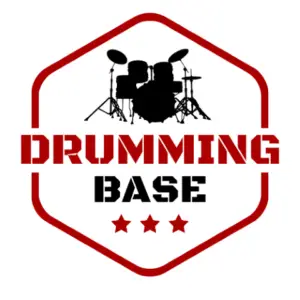There are two types of percussive instruments: pitched and unpitched. In this article I’ll explain the difference between pitched and unpitched percussive instruments and what “definitive” pitch is.
The Quick Answer
Drums (snare drum, toms and kick drum) are unpitched percussive instruments because they are only designed to produce one kind of pitch. Drums do not have definite pitch because the sound has a weak fundamental frequency meaning it is difficult to distinguish the pitch.

Understanding Pitch
To understand the difference between pitched and unpitched percussive instruments, let’s first address what pitch is.
Pitch: describes how low or high a sound is. A high pitched sound is harsh and bright, whereas a low pitched sound is mellow and warm.
As an example, think about a cymbal being struck. This produces a high pitched sound which is sharp and bright. On the other hand, consider the sound of bass drum, this has a lower pitch.
The pitch of a sound is determined by the frequency of the soundwave.
The frequency of a soundwave is also referred to as the speed. It is measured in Hz and records the number of soundwaves per second.
- High Pitched Sound = High Frequency
- Low Pitched Sound = Low Frequency

Pitched vs Unpitched Percussive Instruments
There are two types of percussive instruments: pitched and unpitched.
- Pitched percussive instruments are capable of producing notes of multiple pitches.
- Unpitched percussive instruments are only capable of producing a note with one type of pitch.
Let’s consider some examples.
A xylophone is a pitched percussive instrument. If you hit the different keys of a xylophone then you will produce sounds with different pitches.
On the other hand, drums and cymbals are unpitched percussive instruments because they are only designed to produce one pitch. The aim is to maintain a rhythm, not to influence the melody.
Definite Pitch
Definite pitch refers to a note that can be easily distinguished from another. Notes with a strong fundamental frequency produce a sound with a definite pitch.
Drums do not produce sounds with definite pitch. This is because the sound has a weak fundamental frequency meaning it is difficult to recognise the pitch.

Do Drums Have a Pitch?
Drums do not have definite pitch because they produce a sound with a weak fundamental frequency, however they do still have a pitch. This is because the human ear can still recognise if the sound is “high” or “low”.
Drums are generally considered to be “low-pitched” instruments, particularly in comparison to cymbals which are considered “high-pitched” instruments.
Different types of drums have different pitches. For example, the floor tom has the lowest pitch in a drum kit, whereas a snare drum has the highest pitch.
Check out the table below for some more info. Remember, the higher the frequency, the higher the pitch.
| Percussive Instrument | Frequency Range |
| Floor Tom | 60-80 Hz |
| Bass (Kick) Drum | 80-130 Hz |
| Rack Tom | 130-150 Hz |
| Snare Drum | 170-200 Hz |
| Crash Cymbal | 400-500 Hz |
| Ride Cymbal | 300-600 Hz |
| Hi-Hat Cymbal | 300-3000 Hz |
What Affects the Pitch of a Drum?
So we know that snares have a higher pitch than floor toms, but why is that?
The pitch of a drum is primarily influenced by the diameter and head tension. The smaller the drum head and the more tension it is under, the higher the pitch of the drum will be.
Diameter
Drums with a larger diameter produce a sound with a lower pitch compared to drums with a smaller diameter. This is because the drum head vibrates slower when it is on a larger shell. This is one reason why a floor tom for example, has a lower pitch compared to a snare drum.
Head Tension
The tension of a drum head can be adjusted to lower or increase the pitch. If the drum head is under more tension then the pitch will be higher as the vibrations are faster. Conversely, if the drum head is under less tension then the pitch will be lower.
Here are some more articles that you might find useful:

